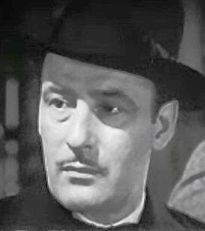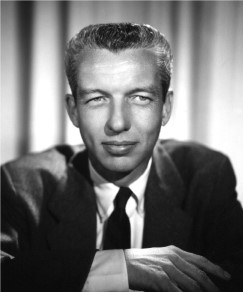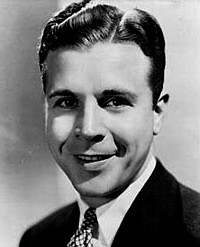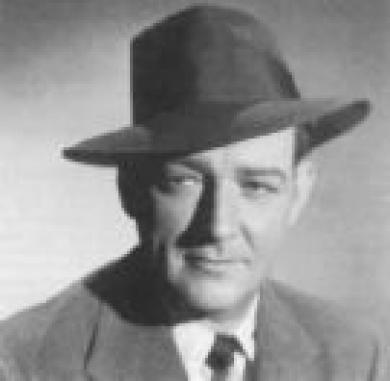
Bob Bailey & Virginia Gregg
Welcome to the Great Detectives of Old Time Radio! A podcast featuring the best vintage detective radio programs. Each week from Monday through Saturday, we feature six of Old Time Radio's great detective series from the beginning of the show to its very last episode. And as a bonus, twice a month we also post a public domain movie or TV mystery or detective show video.
Along the way, I'll provide you my commentary and offer you opportunities to interact.
Subscribe to the show by clicking your favorite podcatcher in the sidebar.
And don't forget to follow me on Twitter and become a fan on Facebook.
- Your host, Adam Graham
Listen to "The Great Detectives of Old Time Radio" on Spreaker.
Currently Featuring
YOURS TRULY, JOHNNY DOLLAR THE FALCON DANGEROUS ASSIGNMENT DRAGNET MR. CHAMELEON ELLERY QUEEN… and more!
View all shows
Check out our other shows:
Recent Posts
Golden Age Article, Nero Wolfe
Book Review: Too Many Cooks
by Yours Truly Johnny Blogger • 0 Comments
In the first three Nero Wolfe books, Rex Stout firmly established that Wolfe rarely leaves the house. From 1937-46, Wolfe was routinely pushed out of the Brownstone by Stout with only two stories in this period allowing him to stay homebound:
- The Red Box (1937) sent Wolfe to a clothing store to question witnesses at the behest of a client and peers in the orchid community.
- Some Buried Caesar (1939) had Wolfe head upstate to put his orchids on display at an exposition.
- Where There’s a Will (1940): had Wolfe visit a client’s house.
- Black Orchids (1942) was the first novella collection and saw Wolfe heading out to another flower show where a murder occurred in the first of two stories.
- Not Quite Dead Enough (1944) featured Wolfe leaving the Brownstone in both novellas.
- The Silent Speaker (1946): Wolfe goes to police headquarters to report to an inspector who replaced Cramer on a case.
However, it wouldn’t be until the 1950s that Wolfe was pulled as far from his home as in Too Many Cooks which sees Wolfe boarding a train to attend a convention of famous cooks in a West Virginia resort town where Wolfe had been invited as a guest of honor to speak about American contributions to fine dining. One of the great cooks, Philip Laszio is despised by his fellows for stealing recipes and for a Machivellian rise through the culinary world, and is killed with suspicion falling on the other cooks.
A wet behind the ears prosecutor asks for Wolfe’s help in the case. When one of Wolfe’s suggestions leads to the imprisonment of a prestigious chef , Wolfe has to set to work to find out what happened.
This book introduced Wolfe’s lifelong friend, Marco Vukcic, the owner of Rosterman’s as a character. Vukcic served as a humanizing force on the Wolfe character. Vukcic was one of the few people to call Wolfe by his first name. Wolfe’s sentiment for Vukcic is in full force when he’s confronted by the widow of the murdered man (who was Vukcic’s ex-wife) and Wolfe delivers a classic smackdown for her ruthlessness.
Even involved in the stereotypically genteel world of cooks, there are risks. At one point in the course of his investigation, Wolfe ends up getting shot.
One controversey that surrounds the book is the use of racial epithets. This is, after all, the South in the 1930s, and it sounds it. There are about a dozen or so uses of the “N-word” and Archie uses a only slightly less offensive term a couple of times. So, it’s hardly at the Huckleberry Finn level of racial language, but like Mark Twain, Stout had a point.
Of course, this is a detective book, so the points couldn’t be too fine or too preachy, and whatever point he’d have to make would have to tie in to the story. On these points, Stout succeeded. Wolfe has reason to believe that the staff know who committed the crime after hearing from a relucant witness that the killer was black.
Wolfe decides to bring the staff up into his suite for questioning. Archie thinks the entire excercise will be a waste of time, as they cops hadn’t gotten anything out of them and that Wolfe wouldn’t know how to communicate with blacks.
Wolfe begins his session by humbly expressing his gratitude to the men for the privilege of being able to come to America. He then learns the men’s names and refers to them by their proper names unless otherwise requested. In other words, Wolfe treated them with the same courtesy and respect that he initially gives to everyone he questions. And through that, Wolfe is eventually able to get their help.
What Stout communicates to a segregated America is that the way to live together in harmony is to treat every person with equal dignity, and judge them on their character. As Wolfe says, ” … the ideal human agreement is one in which distinctions of race and color and religion are totally disregarded.” It’s very powerfully done and not disruptive to the story.
Too Many Cooks is not without its flaws. The first few chapters drag a bit. However, the biggest weakness of the story is that Wolfe dominates the story line to such an extent that there’s really not a whole lot for Archie to do.
Outside of a couple scenes on the train to and from New York, the action is confined to the resort, probably within a couple hundred yards of Wolfe’s room. Archie is usually the focal point of the investigation with a lot of action and runing errand. Here Archie is more reactive and doesn’t even get off many good lines of dialogue. Archie is about as useful and important to the plot as Captain Hastings in a Poirot book. Wolfe’s next novel also took Wolfe away from the Brownstone in, Some Buried Caesar, but in that one, Stout wisely gave Archie a lot more play.
While I can’t say it’s a criticism, the story points to an inconsistency in the Wolfe universe. In Too Many Cooks, Wolfe prepares and delivers a lengthy speech (not fully included) on American contributions to fine dining, and at the final banquet, an all American gourmet dinner is served. Twenty years later in The Next Wintess, Wolfe commends chili as “One of the few contributions America has to world cuisine.” One wonders why Stout changed Wolfe’s mind on this point, or if Stout simply forgot Wolfe had delivered a stirring defense of American contributions to cooking.
The book also includes the recipes for the All-American gourmet meal, the preparation of which is beyond my simple talents. (If you have cookied the recipes in this book, please share your experience in the comments.)
Overall, Stout prepared a very good recipe in Too Many Cooks, although it could have used a dash or two more of Archie Goodwin action.
Overall, I’ll give it a:
Rating: Satisfactory
You can find all the Nero Wolfe books in Kindle, Audiobook, and book form on our Nero Wolfe page.
If you enjoyed this post, you can have new posts about Detective stories and the golden age of radio and television delivered automatically to your Kindle
Golden Age Article, Sherlock Holmes, Yours Truly Johnny Dollar
The Endurance of Johnny Dollar and Sherlock Holmes
by Yours Truly Johnny Blogger • 0 Comments
This is the first article that’s based on a listener/reader question. Wben I was soliciting questions for starting this column on Facebook, Matthew wrote:
How about a study on why Johnny dollar and Sherlock Holmes lasted as long as they did while others shows didn’t.
There were other shows that lasted as long or longer than these two programs such as Mr. Keen, Tracer of Lost Persons (1937-55), Nick Carter (1943-55), and Mr. and Mrs. North (1942-54), but there’s no question that Johnny Dollar (1949-54, 1955-62) and Sherlock Holmes (1930-36, 1939-42, 1943-50) carved out a spot for themselves in America’s golden age of radio that was unique and worth examining.
The glut of radio detective shows came to air from about 1947-51. The success of Rogue’s Gallery and Sam Spade had convinced network executives that there was a market for more detectives, particularly of the hard boiled sort. While some shows were poorly made (ABC’s Danger, Dr. Granger and The Deadline Mysteries) stand out, there were many well-produced shows that got lost in a flood of similar shows. And after the early 50s, the growth of television made it impossible to launch an even well-produced shows like the Adventures of the Abbotts for more than a season.
Sherlock Holmes and Johnny Dollar are separate cases of shows that survived the glut of radio detectives and decline of radio respectively. So, let us begin with what kept Sherlock Holmes on the radio:
1) There’s Only One Sherlock Holmes
The pure number of radio shows hitting the airwaves could not compete for Sherlock Holmes’ audience. Americans had already developed a fond admiration for Holmes. There have been countless adaptations in every imaginable media. The demand for Sherlock Holmes is and was inexhaustable. Therefore, if one network or one sponsor decided they were no longer interested, someone else would step up as they knew there was an audience.
2) Rathbone and Bruce
While Nigel Bruce was only connected with Sherlock Holmes for seven seasons and Basil Rathbone for six, their role in securing the current and future popularity of Holmes cannot be overstated. They were popular and well-beloved with the American people to make listening to Sherlock Holmes a radio tradition than anyone else.
3) A More Leisurely Pace
One reason that radio detective shows burned out is that the vast majority of them were year-round operations. While comedians such as Bob Hope and Jack Benny always took Summer break, radio private eyes had 52 scripts a year to perform and writers had to come up with 52 different mysteries. It was easy for actors and writers alike to run out of creative juice. Even when a detective show did take a Summer break, it was often abbreviated, such as the 4 week Summer Break Edmond O’Brien took from Yours Truly Johnny Dollar in 1950.
With the exception of the torrid 106-week period of 1943-45 that had Rathbone and Bruce appearing every week, the show had shorter seasons. Those prior to the Rathbone-Bruce pairing ran for less than 40 weeks each, the first three Rathbone-Bruce seasons were between 23-26 episodes each, and after the marathon 1943-44 and 1944-45 seasons, all subsequent Holmes seasons were 39 episodes each, giving the writers and Holmes-Watson pair 13 weeks of vacation.
Johnny Dollar:
1) Standing Out From the Crowd:
Like Holmes, the Johnny Dollar productions had something unique going for them. First, was the unique concept of focusing on an insurance investigator. While countless detectives would occasionally be hired by an insurance company, Johnny Dollar was the only network-based detective show which featured a character who specialized in insurance investigations (the syndicated Adventures of Frank Race did as well.)
Dollar was not a typical private detective with a typical relationship with the local homicide squad who was often politely (or not so politely) asked to keep his nose out of police business. Rather, nine times out of ten, Dollar was treated with respect as someone with an official status and a right to be in on the case.
In the second half of the show’s life under producer Jack Johnstone, there was far less competition in the detective area. While a few shows (NBC’s The Big Guy and Mutual’s It’s a Crime, Mr. Collins come to mind) ran for one season each, for the most part Johnny Dollar was the only place in town for a radio detective story from 1955 on.
2) Have Expense Account, Will Travel
While most detectives were more or less stuck in one location. Dollar could easily end up jetting anywhere in the world on his cases, which gave his adventures an exotic feel. You never knew where he’d end up. His investigations could take Johnny Dollar to steel plant, down to Mexico, over near Palestine, over to England, or just down the street from his apartment in Hartford.
3) Adaptability
Johnny Dollar survived because the show adapted and changed. The original run of Johnny Dollar had Dollar as a poor man’s Sam Spade. The change to Edmond O’Brien brought a more Malowesque pathos and world-weariness. The popularity of Dragnet spurred the show to have many episodes that were practically police procedurals. The ability to roll with the punches kept the show going while other programs went down for the count.
4) Bob Bailey and Jack Johnstone
Bob Bailey had put in at least six seasons playing a private eye in Let George Do It and was the perfect choice to revive the series after its one year hiatus. Bailey’s performance was the perfect mix of compassion, tenderness, and toughness that allowed Johnny Dollar to gain a new lease on life, while other detectives faltered.
Jack Johnstone, a veteran of Superman and the Man Called X made a show that was just as exciting for adults as Superman had been for kids. Under Johnstone, the character of Johnny Dollar began to take shape. Johnny developed a favorite hobby (fishing), a couple recurring characters including a girlfriend in the 1960 season. Some of the recurring characters Johnny dealt with included the various insurance company executives who would call on Johnny. Previous shows never re-used the same executive twice, but Johnstone not only reused insurance company men, but gave them distinct personalities. The best known of these was Pat McCracken of the Universal Adjustment Bureau. Johnstone made Johnny more realistic and three dimensional than most of his predecessors. This is why his interpretation of Johnny Dollar is still beloved more than 50 years later.
If you have an idea for a future column, email me.
If you enjoyed this post, you can have new posts about Detective stories and the golden age of radio and television delivered automatically to your Kindle.
1949-54 Johnny Dollar, CBS, Podcast, Yours Truly Johnny Dollar
EP0485: Yours Truly Johnny Dollar: The Merrill Kent Matter
by Yours Truly Johnny Blogger • 0 Comments
Podcast: Play in new window | Download
Subscribe: Apple Podcasts | Spotify | Amazon Music | iHeartRadio | Email | TuneIn | RSS

An anonymous phone call leads Johnny to a small town to investigate whether an insured died accidentally or was murdered.
Original Air Date: November 17, 1951
Support the Great Detectives of Old Time Radio… http://support.greatdetectives.net
Become one of our friends on Facebook…http://www.facebook.com/radiodetectives
Take the listener survey at http://survey.greatdetectives.net
Click here to download, click here to add this podcast to your Itunes, click here to subscribe to this podcast on Zune, click here to subscribe to this feed using any other feed reader.
ABC, Podcast, Sherlock Holmes, Sherlock Old Time Radio
EP0484: Sherlock Holmes: The Adventure of the Innocent Murderess
by Yours Truly Johnny Blogger • 0 Comments
Podcast: Play in new window | Download
Subscribe: Apple Podcasts | Spotify | Amazon Music | iHeartRadio | Email | TuneIn | RSS

A woman bursts into 221B Baker street and shoots a foreign emissary staying with Holmes. Holmes and Watson testify against the woman, but then have to scramble to find what really happened and save their reputation when the woman is acquitted when it turns out the man was poisoned.
Original Air Date: June 30, 1947
Support the Great Detecitves of Old Time Radio…http://support.greatdetectives.net
Click here to download, click here to add this podcast to your Itunes, click here to subscribe to this podcast on Zune, click here to subscribe to this feed using any other feed reader.
Let George Do It, Mutual, Podcast
EP0483: Let George Do It: The Ant Hill
by Yours Truly Johnny Blogger • 0 Comments
Podcast: Play in new window | Download
Subscribe: Apple Podcasts | Spotify | Amazon Music | iHeartRadio | Email | TuneIn | RSS

Lieutenant Riley calls George in to help find the girlfriend of a illegal slot machine repairman in hopes of finding the racket’s kingpin.
Original Air Date: May 15, 1950
Support our Listener Support Campaign…http://support.greatdetectives.net
Become one of our friends on Facebook… http://www.facebook.com/radiodetectives
Call 208-991-4783 to leave a voicemail.
Take the listener survey at http://survey.greatdetectives.net
Click here to download, click here to add this podcast to your Itunes, click here to subscribe to this podcast on Zune, click here to subscribe to this feed using any other feed reader.
Podcast, Rogue's Gallery
EP0482: Rogue’s Gallery: Impossible Murder
by Yours Truly Johnny Blogger • 0 Comments
Podcast: Play in new window | Download
Subscribe: Apple Podcasts | Spotify | Amazon Music | iHeartRadio | Email | TuneIn | RSS

Rogue is hired to protect a lawyer who has been threatened with murder.
Original Air Date: May 16, 1946
Become one of our friends on Facebook…http://facebook.radiodetectives.net
Click here to download, click here to add this podcast to your Itunes, click here to subscribe to this podcast on Zune, click here to subscribe to this feed using any other feed reader.
Barrie Craig, NBC, Podcast
EP0481: Barrie Craig: Murder Island
by Yours Truly Johnny Blogger • 0 Comments
Podcast: Play in new window | Download
Subscribe: Apple Podcasts | Spotify | Amazon Music | iHeartRadio | Email | TuneIn | RSS

Barrie is hired by a wanted fugitive to find out who really committed the murder he was charged with.
Original Air Date: January 9, 1952
Support our Lister Support Campaign http://support.greatdetectives.net
Click here to download, click here to add this podcast to your Itunes, click here to subscribe to this podcast on Zune, click here to subscribe to this feed using any other feed reader.
Share this:
- Click to share on Facebook (Opens in new window)
- Click to share on Twitter (Opens in new window)
- Click to share on Pinterest (Opens in new window)
- Click to share on LinkedIn (Opens in new window)
- Click to share on Reddit (Opens in new window)
- Click to share on Tumblr (Opens in new window)
- Click to email a link to a friend (Opens in new window)
- Click to print (Opens in new window)




